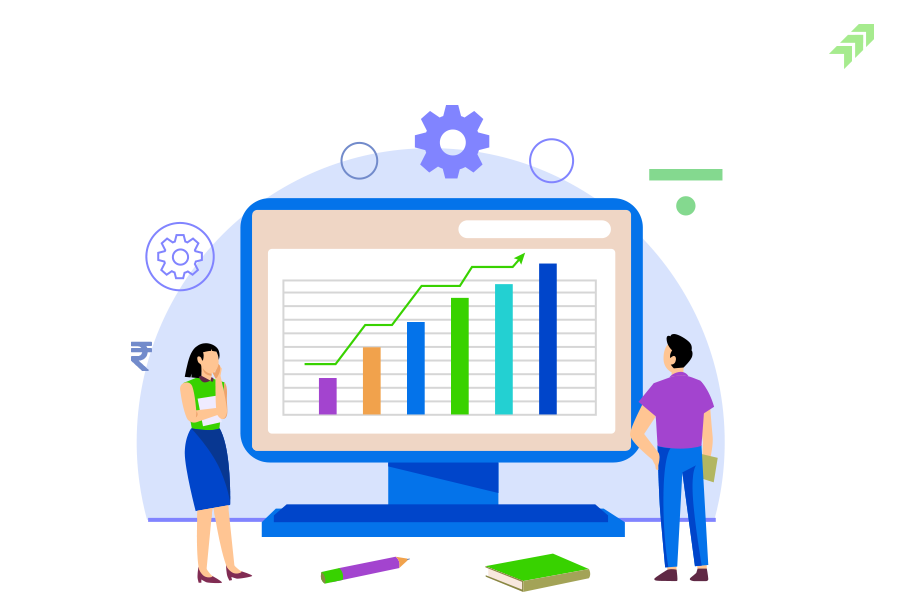The stock market is one of the advanced indicators of the economy, and also one of the most sensitive indices that is affected by various factors. The price of the equity shares listed on the stock exchanges moves with the growth of revenue and net earnings of the company. But meanwhile, there are various things that influence the price of stocks and the market.
From economic activities to sector or industry trends or geopolitical situations and company-specific related actions, there are multiple things that affect the stock market. The positive or favourable factors encourage the market to move upside down, while the negative news or unfavourable factors discourage the stock market from going down to lower levels.
Apart from these fundamental factors, there are technical factors that also influence the stock market. The sentiment of the traders and investors towards index and individual stocks change from the trading point of view also affects the stock market in the short run. Hence, today in this article we will discuss what are the factors affecting the stock market.
Things That Affect the Stock Market
Mostly the macroeconomic factors affect the stock market as a whole. However, when we talk about the individual stock prices of the different companies, then there are various microeconomic factors affecting the stock market due to price changes in stocks for different companies listed in the stock market. Hence, here we will discuss the factors that affect the entire stock market or you can say the benchmark index like Nifty, Sensex and other major indices.
Top 20 Factors Affecting Share Market
#1 Political Condition of the Country
An unstable government in any country is not a good indication of the stock market. The political condition of the country is responsible for formulating government policies and other regulatory frameworks that can boost the economy. A stable and active government can make the right decisions for the economy as well as for the industries in the country.
The stable political condition in the country allows the government to keep focus on the growth of the economy by making strategic decisions for different sectors and industries to ensure the contribution and growth of each sector in economic growth. These kinds of political conditions also influence the stock market to move in the upward direction.
#2 Central Government’s Policies
Apart from the stable political conditions, the central government has to make favourable decisions to boost economic growth and make the business environment for the companies feasible to run with high efficiency and net earnings margins. Government agencies introducing new policies for different sectors also affect the stock market performance.
Also Read: Benefits of Investing in the Stock Market: Advantages of Share Market
The regulatory framework towards specific industries pharma and the financial sector is strictly regulated by the norms and regulations. Increasing or decreasing corporate taxes or imposing duties and taxes for the different sectors, all affect the stock market.
Any kind of favourable or unfavourable policies formed by the central or state government also affect the performance of the corporate sectors and that is visible through the change in the stock prices. Hence, the entire stock market is affected by such decisions.
#3 Geopolitical Relations of the Country
Just like the internal political condition of the country, the geopolitical relations of the country should be also favourable for the economy. How the central government has maintained the relationships with the neighbouring nations also affects the stock market.
The geopolitical conditions of the country with its trade partners and other countries to attract investment from other countries or encourage them to buy the products and services offered by the country all affect the corporate sector and economic growth. Unfavourable geopolitical relations in the internal markets will have a negative effect on the market.
#4 Foreign Trade Policy of the Government
The increase in the demand for the products and services of any country in the international market is mainly dependent on the foreign trade policy of the government. The companies able to export their products and services globally will earn more with better margins but that would be possible only when government takes action to boost the export in the country.
Also Read: Why You Should Invest in the Stock Market: Reasons & Benefits
Similarly, controlling unnecessary imports will not only help to reduce the trade deficit but also help domestic companies sell their products and services in the domestic markets at better prices and profit margins. The favourable foreign trade policies by the government improve the corporate sector and can perform better resulting in the rise of the stock market.
#5 Export Import or Trade Deficit Levels
Higher import and lower export compared to import is not a good sign for the healthy growth of the economy. If the government is not able to take measurable actions to control the difference between exports and imports, there will be trade deficits. It will affect economic growth resulting the negative sentiment among the investors in the stock market.
The high exports compared to imports will bring more money from the overseas market helping the government to improve the forex reserve. The favourable export and import policy will help the corporate sector to increase its earnings from the global markets, helping them to boost their revenue growth and that will be also reflected in their share prices.
#6 Forex Reserve and Currency Price
A higher forex reserve means the country has enough foreign currency to buy or import products and services from other nations when there is any kind of emergency or natural disaster that comes into the country. And this would be possible only when the foreign trade policy is favourable for the country, to bring more money from exports and other activities.
Also Read: Factors Affecting Foreign Exchange Rate: Why Currency Fluctuates
The decreasing value of the currency of any country in the international market is also not a good sign, as it increases the import bill and also indicates that the economy is not running well. However, there are various factors that affect the prices in the currency market, but this will affect the stock market sentiments. Moreover, the companies having revenue income majorly from export business will have better earnings due to the conversion of currency value.
Also Read: Advantages and Disadvantages of Forex Trading: How to Start
#7 Inflation Level in the Country
High inflation in any country is not a good indication in any economy, as it leads to higher pricing of goods and services resulting in the demand and investment will decrease. The high inflation also leads to high commodities prices decreasing the purchasing power of individuals resulting the lower savings and investments among them. High inflation levels reduce the savings of people which also decreases their investment by them in the stock market.
However, the high inflation affects the growth of the entire economy, and the expectations of slower economic growth also affect the performance of the stock market. To control inflation country's central bank increase the interest rates which leads to higher borrowing cost for everyone resulting in the banking sector and stock market both being affected.
#8 Central Banks Monetary Policy
The monetary policy of the central banks in the country also badly affects the movement of the entire stock market, especially due to banking stocks. As we already told you in the previous paragraph, to measure the high inflation rates, the central banks increase the interest rates. And this kind of preventive measure by the central bank tightens the liquidity in the market.
In India, the Reserve Bank of India (RBI) is the apex body responsible for taking monetary policy related to all types of actions. From time to time as per the liquidity in the market and inflation data, RBI keeps changing or holding the interest rates like Repo or reverse repo rates and cash reserve ratio (CRR) that affect the bank's stocks and the entire stock market.
#9 Economic Growth or GDP Data
This is one of the most important economic indicators affecting the stock market in every country. The Gross Domestic Product (GDP) growth is the indicator of economic growth in a country. The slower GDP growth or slower economic growth as per the expectations of the experts also affects the stock market movement. GDP shows the overall health of the economy.
The positive GDP growth as per the current economic conditions encourages the stock market to keep moving in the upward direction. GDP reflects the overall production by the public sector and private sector which shows the health of the entire economy.
The GDP numbers can be affected due to economic slowdown or recession in the economy. But when such a phase comes, the stock market already discounts the upcoming and current situation of the economy. However, when it recovers and if the recovery of economic growth is better or faster than expectations then the market moves in the upward direction as soon as such numbers of economic indicators are disclosed by the Government agencies.
#10 Indian Industrial Production Data
Just like GDP, the Index of Industrial Production Data or India Industrial Production (IIP), is the production growth of India's industrial sector. This indicator is published by the Central Statistical Organisation (CSO) every month and gives the growth rates of different industry groups of the economy over a specified time period that also affects the stock market.
In IIP, the eight core industries of India representing about 40% of the weight of items are included. Eight core sectors and industries are Electricity, Steel, Refinery products, Crude oil, Coal, Cement, Natural gas and Fertilizers accounted for in IIP data. This data is published every month and whenever the IIP data comes better than expectations, then the stock market reacts positively with most of the stocks of the top companies from these sectors in an uptrend.
#11 Natural Calamities and Disasters
Natural disasters like floods, earthquakes, tsunamis, tornados hurricanes and any other calamity that affects the life of humans on earth and other activities also affect the growth of the economy. Though it is not necessary every type of natural disaster affects the stock market, the intensity of loss damage to the industries and economy is defined.
During the COVID-19 epidemic in 2019, we have seen how it has badly affected the daily lives of people and economic activities across the world. And reacting to this unexpected situation, the stock market globally started falling down hitting the lower circuits.
Also Read: What is Upper Circuit and Lower Circuit in Share Market: SEBI Rules
Similarly, if any kind of natural disaster hits the economy, it will be also reflected in the movement of the stock market, and the share prices of sectors or companies more damaged due to such calamities will be more affected by downside movements.
#12 Investment by the Institutional Investors
Institutional investors like Foreign Institutional Investors (FIIs) and Domestic Institutional Investors (DIIs)are playing one of the biggest roles in the stock market movement. Yes, when these institutional investors pour huge amounts of money to buy the stocks of top companies in bulk, then there is significant movement and stock market breakout.
Also Read: What is Breakout & Breakdown How to Identify Breakout in Stocks
These institutional investors are designated as qualified institutional buyers by the SEBI and Stock Exchange, hence they also buy or sell the stocks through the block deal to accumulate large quantities of shares of any company. This kind of huge amount of investment also affects the prices of the different stocks, resulting the market moves.
#13 Corporate Earnings and Performance
All the listed companies are compulsory to report their financial performance every quarter with detailed financial results compared with previous quarters and last year's quarters to show how the company has performed during that period. And whenever these corporate earnings are published by the top companies the stock market also movies.
Though, most of the time the financial results of the top companies are estimated by the fund houses and research analysts. When the performance is beyond expectations the stock market reacts in a positive way and keeps moving in an upward direction. On the other hand, if performance was below expectations, the stock prices fell down.
#14 Liquidity of Funds in the Market
People will invest in the financial markets or any kind of other instruments only when they have enough funds available. Hence, many times stock market is also affected due to the unavailability of funds to investors or high liquidity in the market. The level of liquidity of funds depends on the economic or financial calendar, if it is the time to liquidate the investments, then most of the people sell the stocks resulting in the stock market going down during that phase.
Similarly, when institutional investors need funds they liquidate their investment in stocks at a large scale resulting stock market going down. On the other hand, when individual investors or institutional investors have surplus money or enough funds available in their bank account they tend to invest in the equities resulting in the stock market going up. And when there huge volume of trade takes place, the stock market moves in either way direction with a strong trend.
Also Read: Importance of Volume in Technical Analysis: Use & Role in Trading
#15 Demand and Supply in the Market
The gap between the demand and supply of shares in the stock market is also one of the leading factors influencing the stock market. Yes, just like economic theory the lack of supply of commodities or anything compared to its demand will lead to an increase in the price of that commodity or anything including the financial instruments or stocks in the market.
When the buyers are dominant in the secondary market and keen to buy the stocks at any level, and there are fewer sellers compared to buyers, then the prices of stocks move up. This kind of difference between the demand and supply of shares pushes most of the individual stocks resulting in the entire stock market in an uptrend or becoming bullish for a few days.
You can see this kind of gap between the demand and supply of shares in the primary market (IPOs). I think you have noticed many times when an IPO is oversubscribed, it means the demand for shares issued by the company is much higher among the investors.
People are ready to invest in the company and also ready to buy the shares at issue price or even at much higher rates when the stock is listed in the secondary market. This kind of gap between the demand and supply of shares of that company pushes its price at high levels within a few trading sessions. And this kind of situation also comes when there is too much gap between the buyers and sellers then the whole stock market moves in the upwards direction.
#16 Company Related Individual Factors
This is one of the most important microeconomic factors affecting the stock market. Nevertheless, I’m talking about the stocks of individual companies that are also affected due to various fundamental factors like financial performance, new product or service launches, mergers or acquisitions, increase in borrowings or debts, changes in the management and operational activities or any other corporate actions all can affect the price of that company’s stocks.
Also Read: Why is Fundamental Analysis Important for Investing in Stocks
These factors are called the fundamental factors that analyst usually consider while performing the fundamental analysis to find out the intrinsic value of the stock price of the company or while preparing research reports for their clients. The stock price of companies is highly sensitive towards such actions and immediately reflects the price change in the market.
#17 Prices of Gold & Other Precious Metals
Apart from the equity market, people also invest their money in precious metals like Gold and Silver. Gold is considered another safe haven to capitalize the money that can stay safe during times of recessions or uncertain economic conditions. When people tend to invest in Gold they liquidate their investment in equities resulting in market falls.
Also Read: What is Equity Share: Types, Importance &How it is Calculated
However, the change in the price of Gold also influences people to buy these precious metals or switch over their investments from stocks to gold or vice-versa. When the Gold price goes down people tend to buy it, or when they feel the stock market is going to fall down in the upcoming phase they divest their investment in equities and put the money into the Gold. Similarly, when Gold prices are at higher levels they sell this precious metal and invest the fund into equities.
#18 Change in the Price of Bonds Yields
Similarly, just like precious metals, Government Bonds are another safe financial instrument investors buy, but especially when the bond yields are higher. This kind of action taken by mainly the big fund houses or financial institutions at large scale affects the stock market movement. As there is an inverse relationship between stock prices and bond yields.
When the bond yields rise, it indicates higher returns on fixed-income investments, encouraging the investors to liquidate their investment from stocks and buy the bonds, resulting in the stock market falls. Conversely, when the bond yields are at lower levels, stocks become more attractive financial instrument options for investors, encouraging them to buy more stocks from the equity market which drives the entire stock market growth.
#19 Regulatory Actions Taken by the SEBI
The stock market is regulated and controlled by the regulatory body created by the central government. In India, the Securities Exchange Board of India (SEBI) is responsible for taking regulatory actions in the stock market through regulatory frameworks and norms created and imposed through stock exchanges that also affect the stock market movements.
Any kind of favourable or unfavourable decision regarding the stock market operations or rules or regulations that can affect the investing criteria can affect the sentiments of the investors resulting in the stock market also going down or up. Though, SEBI keeps an eye on unusual or unauthorized activities in the stock market and can impose any kind of restrictions on trading in a particular stock to prevent insider trading and safety of investor’s funds.
Though all the regulatory actions are executed by the stock exchanges on the instructions of SEBI but directly affect the sentiments of the investors or traders having long-term investments in stocks or creating short-term positions in intraday the F&O market. Though it does not happen all the time sometimes strict regulatory actions can affect the movement of the entire stock market or to the stock of individual companies that come into SEBI’s scanner.
#20 Sentiments of the Investors & Traders
Last but not least, the sentiments of the investors and traders are also one the very important factors affecting the stock market in India. Market sentiment refers to the psychology of market participants, individually and collectively of all the investors and traders. And as per the human tendency market sentiment can be subjective, biased, and obstinate. If investors are ready to take risks, they will invest aggressively, resulting in the stock prices will go up. Conversely, if investors are in passive mode, and prefer safety over risk, then the stock prices will go down.
The sentiments of the market keep changing as per the sentiments of the investors and traders. And there are various factors behind the sentiments of the investors and traders. The current situation and future expectations from the market or the ongoing and upcoming economic activities, expiration of contracts in the derivatives market, liquidity in the market and availability of funds, are the various factors that influence the sentiments of the investors and traders.
Moreover, the sentiment of the traders also changes due to technical factors in the stock market. Suppose the broader market main index Nifty is trading at its strong physiological point of 20K and if it rises further, it encourages the trader to start buying or create long positions in the stocks. Similarly, when the market goes below this physiological point, traders create short-selling positions in the stocks in anticipation that the market will go down further. And to check the positive or negative sentiment of investors you can use the volume indicators for intraday trading.
Also Read: Best Volume Indicators for Day Trading & How to Use for Intraday
These physiological points' of market indices work like support and resistance or crossover points and based on movement below or above these points the sentiments of people change. Hence, while investing in the stock market you need to perform a technical analysis using the technical indicators to know such physiological points that affect the market.
Also Read: Is Technical Analysis Useful or Useless or Enough for Trading
Summing-up
There are many factors that are affecting the stock market movement. From macroeconomic indicators to microeconomic factors all can influence the equity market or price of the individual stocks. Here, you need to keep all such factors in your mind while investing in the stock market, so that you can analyze the stock market movement considering all of them.
Also Read: What to Know Before Investing in Stocks: 10 Things to Consider
In the stock market, most of the factors can affect the price movement of individual stocks, but all the factors do not work at the same time or can occur often depending on the economic situations and fundamental conditions of the listed companies. And without considering these important factors there is a huge risk while investing in the stock market.
Also Read: Types of Risks Associated with Investing in the Stock Market
Here, you need to perform the fundamental analysis and technical analysis that discount the impact of all these factors and are clearly visible in the price of stocks. In technical analysis, you can use the best technical indicators to find out the trend in the stock market and the right levels to buy or sell the stocks with the higher chances of earning more profits.
Also Read: How to Identify Trend in Stock Market: 10 Points to Find Trend
However, if you don’t have such knowledge or facility to perform the fundamental or technical analysis, then you can get help from the market experts. These market experts like fundamental analysts and technical analysts have better knowledge and experience in analyzing these stock markets while considering such factors to recommend the right timings and levels to buy the stocks. Here you have to choose the best discount brokers in India offering such a facility with best trading platform to invest in the stock market or other financial instruments safely.
Also Read: Technical Analysis vs Fundamental Analysis: Which is Better
Moneysukh is right here to help you invest in equities, commodities and the currency market with the facility to open a trading account and demat account. Trading or investing with Moneysukh, you not only get tips and recommendations to invest in the stock market but also get the facility to trade with high-frequency trading software like Algo-trading.
Also Read: What is Algo Trading How it Works and is it Profitable
Moneysukh provides online trading software like Trade Radar, along with the online trading application to choose the best intraday algo trading strategy or the most popular & profitable algo-trading strategies for the equity market. Here you can use the TradingView software for charting and performing technical analysis using the tools and technical indicators that are accessible through multiple devices with the lowest broking fees and charges in the industry.
Also Read: Equity or Commodity which is better for Trading or more Profitable


















No comment yet, add your voice below!